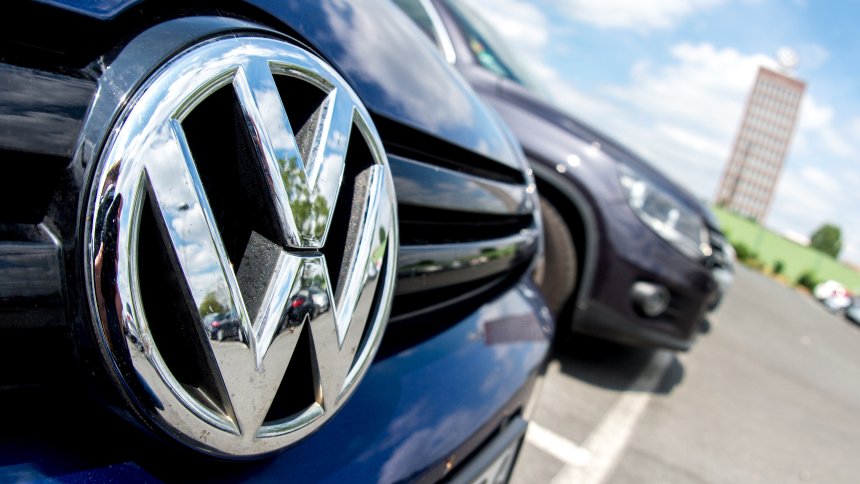The billion has not yet been transferred, but Lower Saxony’s politicians are already discussing what should happen to the fine. The judiciary wants to invest in its own ranks, the Greens in the mobility turnaround.
VW Golf in front of corporate headquarters
Thursday, 14.06.2018
17:35 clock
The billion-dollar fine imposed on Volkswagen in the diesel affair sweeps Niedersachsen unexpected revenue into the coffers. Shortly before the budget review of the red-black coalition government on 24 and 25 June, the parties demand the money for various projects.
“The state government will submit a proposal on the use of funds in the context of budgetary discussions,” the State Chancellery said in a statement.
Both Prime Minister Stephan Weil (SPD) as well as economics minister Bernd Althusmann (CDU) are representatives of the state government in the VW supervisory board. They welcomed the recognition of the fine by Volkswagen and emphasized that the Group thus acknowledged its responsibility. Lower Saxony has 20 percent of the VW voting shares and thus in fact a right of veto for important decisions.
No consideration for national financial equalization
According to the Ministry of Finance in Hanover, the VW billion does not fall into the area of taxes or similar taxes levied for the Financial equalization must be taken into account. In the current 2018 budget, the Ministry of Finance has reportedly generated revenue of 350 million euro through court costs, fines and similar payments to the higher regional courts.
The A one billion euro fine was made on Wednesday imposed, because the prosecutors saw supervisory duties violated at VW occupied. It should be transferred within six weeks to the Landeshauptkasse. The concrete consequences for the budget are being examined.
First interest groups have already expressed their wishes for use. The Chairman of the Lower Saxony Judicial Union (NRA), Frank Bornemann, said the amount should be used to finance much needed justice jobs.
The 250 posts promised to prosecutors and judges in the coalition agreement cost 25 million euros per year, including ancillary costs. With the billion, these jobs could be financed for 40 years. “We will not accept it if this money generated by the judiciary itself is not used there,” said Bornemann, who demanded a clear pledge from Finance Minister Reinhold Hilbers (CDU).
Steuerzahlerbund wants to reduce debt mountain
Partial support he received from the Lower Saxony FDP leader Stefan Birkner. However, he initially set other priorities: “The unexpected government blessing must invest the federal government in the debt reduction.” He added: “This not only relieves future generations, the saved money is available to the state budget in the long term.” That would also strengthen the judiciary.
In contrast, the taxpayer federation demands that the entire amount goes into the reduction of the debt mountain of 61,4 billion euro. “The money must not become the maneuvering mass of the policy in the distribution of benefits, but the reduction of budgetary risks by the high debt mountain must rather have the highest priority,” said Bernhard Zentgraf of the Federation of taxpayers Lower Saxony and Bremen.
Greens call for expansion of the mass transit system
The member of parliament Stefan Wenzel (Greens) said with regard to the diesel affair: “It would be fatal if the impression arises, VW could buy here free.”
Green Party leader Anja Piel called for massive investments in the mobility shift, including the expansion of the cycle path network or an efficient public transport system. The car makers would have caused by the fraud high damage to the environment, health and the entire economy.
Lower Saxony’s budget surplus from the previous year is 1.2 billion euros. Hilbers wants to use 100 million to debt repayment and rises so for the first time in 50 years in the reduction of debts of 61.45 billion euros. For the year 2018, he expected thanks to the good Economy so far with about 27.6 billion euros in revenue and a tax plus of 258 million euros.

